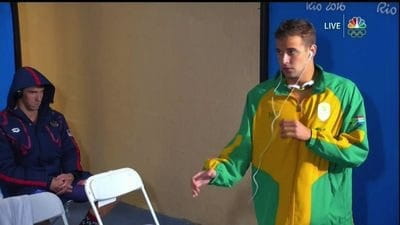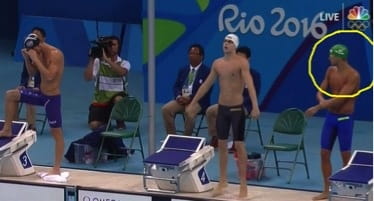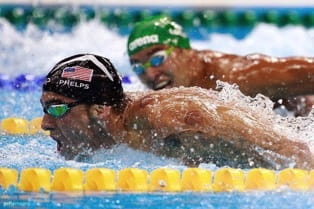Like millions of other people, I have been riveted to Olympic coverage this week, and especially to the swimming pool and Michael Phelps. The idea that a guy his age can come back for a fifth time and continue to dominate the sport is simply amazing and inspiring. As I watched the pool events the last couple of days, the one side story that has emerged to the forefront is the animosity between Phelps and his most discussed opponent Chad le Clos. It makes for entertaining TV and great internet memes.
But the more I think about this competitive relationship that has become highly personal, the more I feel there is something of deep value to be learned from it.
In spite of the shadow boxing, shaking and outlandish antagonism we have seen from Chad le Clos the past few days, it turns out he once looked up to and greatly admired Phelps. He still calls Phelps his "ultimate hero," and says that beating him in the 2012 Olympics was "the most overwhelming feeling." le Clos has studied and admired the swimming of Phelps for years, and his goal was to someday "beat the best of the best."

His motivation served him well: it gave him the drive to reach the Olympic games and win the 2012 Olympic gold medal in the 200 meter butterfly, beating his lifelong hero. It was a stunning upset, the first defeat of Phelps in a decade, and it appeared the torch was ready to be passed to a new hero.
But things went south when his hero indirectly insulted him from retirement, claiming le Clos and the other swimmers weren't really that fast. le Clos took things personally and started lashing out at Phelps, who used his loss to le Clos as a degree of motivation to return to the pool once more. Phelps is reported as saying, "Chad liked me, and then he didn't like me. He said I was his hero, and then he was calling me out."
Here's where we get to the lesson: Phelps did not return to the pool simply to show up le Clos, but in large part because he had his eye on the goal of continuing to win and he still had the desire for the prize. To watch Phelps swim is to see that he is competing against himself and the clock. He is focused, determined and never looks away from the pool. His eyes are on the prize and his focus is singular, regardless of the distractions.

le Clos, on the other hand, is clearly preoccupied with Phelps, being sure to warm up right in front of him in the green room, staring at him on the pool deck right up until the start of the race, and even continuing to look over at him while in the water mid-race.

Both are incredible swimmers, but one is focused on the goal and one is not. One is determined and one is distracted. One is pressing forward and the other is looking to the periphery in comparison.
The result is that Phelps comes home with yet another gold medal and le Clos goes home without one, placing fourth.
In Phillipians 3:13-14 Paul writes, "Forgetting what is behind and straining toward what is ahead, I press on toward the goal to win the prize for which God has called me heavenward in Christ Jesus."
How easy it can be for us to make the same mistake as le Clos. When we find ourselves in difficult situations where we should continue pressing on, keeping our focus on Christ, we can become distracted and lose our way.
We can become distracted by watching what others around us are doing, by our past, by our limitations, by our fears, by today's headlines, by politics, and by our own uncontrolled emotions.
1 Peter 1:13 instructs us to "prepare our minds for action." When we do this, we find ourselves in better position to gain the prize God has for us and live the life we are called to and searching for. We keep our focus from wandering, and instead directed where it belongs. This is where we will find victory.
As a writer and musician, Jason Soroski strives to communicate in a way that is insightful, meaningful, relevant, and mindful of the small things that we may otherwise overlook in our everyday lives. He effectively taps into his experiences as a worship pastor, classroom teacher, husband, and homeschooling father of five to relate poignant stories from real-life experiences. Jason holds an M.Ed. from Missouri Baptist University, has been featured in various print and web publications, and currently resides in Houston, TX. Read more from Jason at his blog The Way I See It.
Publication date: August 11, 2016